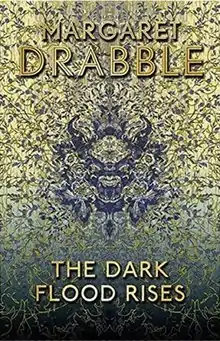The Dark Flood Rises
The Dark Flood Rises is the 20th novel of Margaret Drabble, and was first published in 2016.

Theme
The title of the book is a quotation from a poem, The Ship of Death, by D H Lawrence about mortality: “Piecemeal the body dies, and the timid soul/has her footing washed away, as the dark flood rises.” The main theme is growing old and dying. It is told from multiple viewpoints, all of people linked in some way to Francesca (Fran) Stubbs, an elderly woman who does occasional work for a charity on aspects of living accommodation for the old. There is no strong plot: rather the book conveys different experiences of, and attitudes to, the twilight years of life, with the past histories of the main characters' lives being gradually revealed. In the background are two major contemporary concerns - climate change and the refugee crisis of the years during which it was written, to which there are frequent references: the flood in the title is also a reference to the effects of climate change and to the seas on which many refugees sought to escape to Europe. There is also mention of other potential ecological catastrophes, over which Fran's daughter Poppet is very concerned.
Critical reception
Critical reaction to the book was generally favourable. Reviewers remarked on the relative absence of plot, the mordant wit with which the theme is lightened, and the way the narrative approach, with its multiple viewpoints, mirrors the wanderings of Fran's own mind. The reviewer for The Independent described the book as "witty and intelligent but ultimately uncomfortable, melancholic and rather doom-laden work. It’s not a particularly easy book to read, but it is brimming with relevance." [1] The Guardian reviewer wrote, "beneath the apparently placid surface, Drabble’s novel seethes with apocalyptic intent." [2] The New York Times reviewer summed up the book: "this humane and masterly novel by one of Britain’s most dazzling writers is something else as well, deeper than mere philosophy: a praisesong for the tragical human predicament exactly as it has been ordained on Earth, our terminal house." [3]
References
- https://www.independent.co.uk/arts-entertainment/books/reviews/the-dark-flood-rises-margaret-drabble-review-a7419476.html
- https://www.theguardian.com/books/2016/nov/03/the-dark-flood-rises-by-margaret-drabble-review
- https://www.nytimes.com/2017/02/14/books/review/dark-flood-rises-margaret-drabble-.html?_r=0
Further reading
- The Guardian, 3 November 2016, retrieved 16 May 2017: The Dark Flood Rises by Margaret Drabble review – coming to terms with death
- The Independent, 15 November 2016, retrieved 16 May 2017: The Dark Flood Rises by Margaret Drabble, book review: A rather doom-laden work
- New Statesman, 30 November 2016, retrieved 16 May 2017: Margaret Drabble's The Dark Flood Rises is a significant achievement
- New York Times, 14 February 2017, retrieved 16 May 2017: Death and Disaster Stalk the Characters in Margaret Drabble’s New Novel